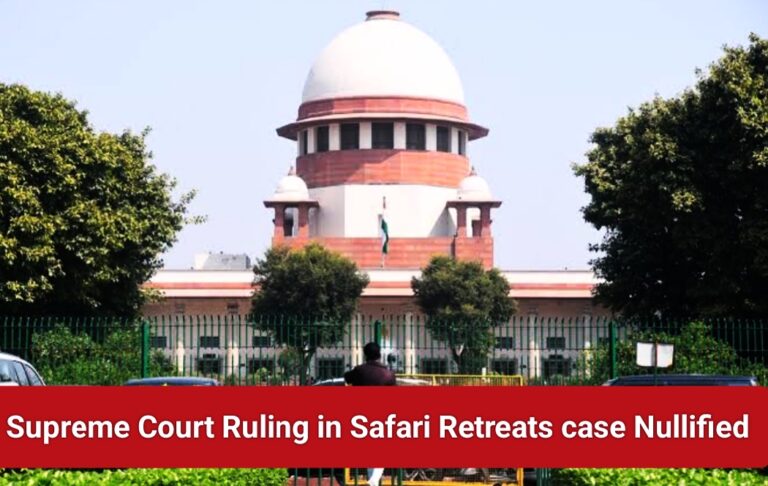The Supreme Court in case of Safari Retreats Interpreted the term “Plant or Machinery” to include buildings constructed for specific business needs as “Plant”.
The GST Council has proposed a significant amendment to the Central Goods and Services Tax (CGST) Act that nullifies a landmark Supreme Court ruling in favour of Safari Retreats. This ruling had allowed businesses to claim input tax credits (ITC) on construction costs for rental properties, which the Council now seeks to reverse with a retrospective amendment effective from July 1, 2017. The proposed change has raised concerns across the construction and leasing industries and has sparked debates about its legal and economic implications.
The Retrospective Amendment: Key Details
The amendment seeks to replace the phrase “plant or machinery” with “plant and machinery” throughout the CGST Act. The government has characterized this move as a correction of a “drafting error” to align with the language used elsewhere in the tax code. However, this change effectively nullifies the Supreme Court’s interpretation in the Safari Retreats case, which had expanded the definition of “plant or machinery” to include buildings constructed for specific business needs, provided they met a functionality test.
The Supreme Court’s Landmark Ruling
In October, the Supreme Court’s judgment in favour of Safari Retreats had been hailed as a game-changer for the commercial real estate and leasing sectors. By allowing ITC claims on buildings that met the functionality test, the court’s decision significantly reduced costs for businesses investing in construction for leasing purposes. The ruling was celebrated for fostering investment and aligning with the GST’s fundamental objective of minimizing the cascading effect of taxation.
Industry and Expert Reactions
The GST Council’s decision to retroactively overturn the Supreme Court ruling has drawn widespread criticism from tax experts and industry stakeholders.
Gyanendra Tripathi, Partner at BDO India, expressed strong disapproval, stating, “Many companies, relying on the Supreme Court decision, had claimed ITC for immovable properties qualifying as plant. Now, all such claims must be reversed. The industry will view this change as regressive, and it could face legal challenges.”
Saloni Roy, Partner at Deloitte India, highlighted the adverse impact of the amendment on businesses, noting, “The Supreme Court’s broader interpretation of ‘plant or machinery’ was welcomed by businesses. This decision by the GST Council will force companies to reassess their positions, dampening the optimism generated by the Safari Retreats ruling.”
Abhishek Jain, Indirect Tax Head & Partner at KPMG, raised constitutional concerns about the retrospective nature of the amendment. He observed, “Similar retroactive measures have been challenged in the past. While certain cases like construction for own use or pre-fabricated buildings might still benefit, the overall outlook for ITC claims has turned uncertain.”
Gourav Sogani, Partner at Economic Laws Practice, warned that the amendment could have a chilling effect on the real estate sector, particularly for businesses constructing and leasing commercial properties. “The Supreme Court’s judgment supported the core GST principle of reducing tax cascading. This reversal undermines that principle and will increase costs for businesses,” he said.
Financial Implications for Businesses
Businesses that had already claimed ITC based on the Supreme Court’s ruling now face the possibility of reversing those credits. This could result in significant financial strain, as companies will need to reassess their tax positions and account for increased costs. The move is expected to particularly impact the leasing operations of commercial real estate companies, which had relied on ITC claims to offset construction expenses.
Broader Implications and Legal Challenges
The retrospective nature of the amendment has sparked debates about its legality and fairness. Analysts have pointed out that retroactive tax amendments often face judicial scrutiny, with courts previously striking down similar measures on constitutional grounds. The amendment’s impact on investment sentiment in the commercial real estate sector is also a major concern, as businesses may become wary of regulatory uncertainties.
Statement of the CBIC Chairman
The Chairman of the Central Board of Indirect Taxes and Customs defended the amendment, stating that it addresses an inconsistency in the CGST Act. “The term ‘plant and machinery’ appeared 11 times in the Act, with only one instance of ‘plant or machinery under clause (d) of the section 17(5).’ The correction ensures alignment with the intended meaning,” he explained.
Provisions under Section 17(5)(d) at present
“No Input Tax Credit (ITC) will be available in case of goods or services or both received by a taxable person for construction of an immovable property (other than plant or machinery) on his own account including when such goods or services or both are used in the course or furtherance of business. The expression “construction” here includes re-construction, renovation, additions or alterations or repairs, to the extent of capitalization, to the said immovable property.”
Conclusion
The proposed amendment to Section 17(5)(d) of the CGST Act represents a turning point for the GST framework, with far-reaching consequences for businesses and the tax ecosystem. While the government’s intent to standardize the law may have merit, the retroactive nullification of a Supreme Court judgment raises questions about regulatory stability and fairness. As the industry braces for the financial and legal fallout, the amendment is likely to face intense scrutiny in both legal and public forums. Whether this decision will withstand judicial challenges remains to be seen, but its impact on the commercial real estate and leasing sectors is already profound.
Also Read: Government to Implement Track and Trace Mechanism for Fighting Tax Evasion
READ MORE
Guidance Note 2/2024: Direct Tax Vivad Se Vishwas Scheme, 2024
New Income Tax Bill Unlikely to Be Introduced in Budget 2025
